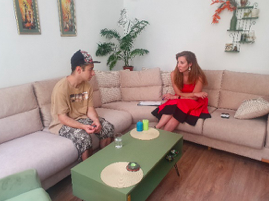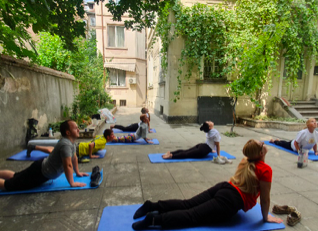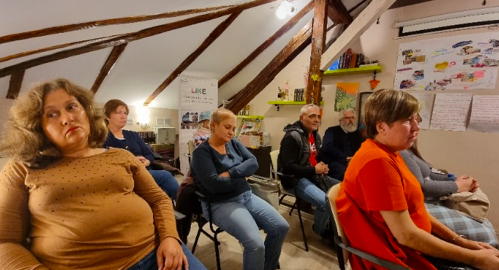Europe is facing a pressing issue: integrating NEETs (Not in Education, Employment, or Training) with mental health challenges into the labor market. Stigma, misunderstanding, and insufficient support systems that often fail to address the unique needs and challenges of these young peoplecontribute to high rates of unemployment and social exclusion. The L.I.K.E project acknowledges these issues and seeks to tackle them through a multifaceted approach that engages the entire community.
In order to achieve sustainable employment among NEETs with mental health problems and improve the effectiveness and success of the target group in the labour market, an innovative multidimensional methodology has been developed. The multidimensional program that is being applied in the Youth Houses “Hidden Likes” has become a successfully working system for the integration of NEETs with mental health problems in the labour market and in society. The strength of the multidimensional model and the main reason for its success regarding the specifications of the particular target group is its multidimensional approach which works holistically in several directions. On one side it is directed towards the work with NEETs themselves and their families and close circle of people. On the other side, the model is directed towards the employers’ sector and society in order to reduce the stigma and to raise awareness regarding the target group.
Central to the project’s success is its emphasis on understanding the root causes of unemployment and passivity among the target group. Through in-depth studies, L.I.K.Ewas aiming to identify and address systemic barriers, including social stigma and lack of awareness among employers. By challenging misconceptions and promoting inclusivity, the project paved the way for meaningful participation in the labour market.
Best practices in working with employers include:
- Conducting information and anti-stigma campaigns among employers about the specifics of the target group. Young people with mental health problems face various challenges, including social isolation, stigma, and discrimination, which can negatively impact their well-being and quality of life. Feeling like an integral part of the community can help NEETs feel valued, connected, and supported. It can also promote a sense of belonging, self-esteem, and purpose.
- Creating an appropriate work culture and atmosphere, offering the opportunity to receive feedback and emotional support. Creating an appropriate atmosphere that promotes a positive and supportive environment can have a significant impact on the mental health and well-being of NEETswith mental health problems. Providing them opportunities to receive feedback and emotional support can help NEETs feel valued, supported, and motivated, which can lead to higher levels of motivation and engagement.
- Introducing a system for integrating NEETs with mental health issues on the labor market in the Hidden Likes Youth House that provides a safe environment for young people with mental health problems and their relatives.
Furthermore, L.I.K.E recognizes that sustainable change requires a long-term, multilateral approach. By developing the innovative methodology for motivation and skill-building, the project equips young people with the tools and confidence needed to thrive in the workforce and beyond.
Best practices in working with NEETs which encourage social inclusion and development of life skills:
- Providing greater precision in performing an individual assessment of the needs of every unemployed youth with mental problems as well as identifying appropriate support measures in each individual case. This individualized approach can help address the unique needs and challenges of each individual, promote their well-being, and enhance their chances of successful employment.
- Providing therapeutic services, counseling and support for depression, anxiety, suicide risk, eating disorders, etc. Providing access to mental health services and support can help individuals manage their symptoms, improve their mental health and well-being, and enhance their ability to participate fully in their community and pursue their goals.

- A range of social and practical skills that will integrate them socially, as well as help their inclusion in the labor market. Such activities include:
- Animal therapy;
- Art therapy;
- Gardening
- Sports activities (yoga, gym);
- Seminars promoting healthier lifestyles and personal growth.

As a result of all the initiatives and thought fully chosen interventions one of the most significant outcomes of the L.I.K.E project has been the improvement in the mental health of NEETs. By offering targeted support, such as counselling, therapy, and skills development activities, the project has provided NEETs with the tools and resources needed to manage their mental health effectively, leading to enhanced overall well-being and resilience.
Moreover, the L.I.K.E project has been instrumental in facilitating the labour market integration of NEETs with mental health issues. By offering career consultations, job placement assistance and ongoing support, the project has empowered participants to secure meaningful employment opportunities suited to their skills and interests. As a result, L.I.K.E has created pathways for NEETs to access job opportunities and develop sustainable careers, thereby reducing their dependence on social welfare systems and fostering economic independence. Remarkably, over 50% of NEETs enrolled in the L.I.K.E. Project and Hidden Likes Youth House activities have achieved successful job placements, marking a significant milestone in their journey towards employment and self-sufficiency. Equally promising is the fact that the remaining participants are diligently pursuing job opportunities and further education with unwavering determination. This collective progress underscores the effectiveness and relevance of the program in empowering NEETs to overcome barriers and transition into meaningful employment.
Furthermore, the project has played a crucial role in promoting autonomy among NEETs with mental health challenges. By fostering a sense of agency and self-efficacy through empowerment programs and peer support networks, participants have gained confidence in their abilities and decision-making skills. As a result, they have become more self-reliant and capable of navigating various aspects of their lives, including education, employment, and social relationships.
In addition to its direct impact on NEETs, the L.I.K.E project has also sparked positive changes in the mindset of employers towards hiring individuals with mental health issues. Through awareness campaigns, training workshops, and employer incentives, the project has challenged stigma and misconceptions surrounding mental health in the workplace. Employers are now more open to accommodating the needs of employees with mental health challenges and providing inclusive work environments that promote mental well-being and productivity.


